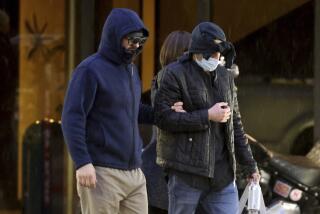Agent Tells of Poindexter-North Parleys
- Share via
WASHINGTON — Former National Security Adviser John M. Poindexter acknowledged during the height of the Iran-Contra scandal that he had discussed the covert operation regularly with Lt. Col. Oliver L. North and could have stopped it, an FBI agent testified Thursday.
But Poindexter had denied any direct involvement in the affair, putting the blame squarely on North, said FBI agent Ellen Glasser, who interviewed Poindexter in his suburban home in 1986.
Even so, the agent’s account was damaging to Poindexter, the retired rear admiral who is being tried on one count of joining North in a conspiracy to divert profits from Iran arms sales to the Contras in Nicaragua and on four counts of obstructing and lying to Congress.
Glasser also testified that more than 5,000 messages were hurriedly deleted from Poindexter’s computer just before the White House forced his resignation as the Iran-Contra affair developed into a major scandal for the Ronald Reagan Administration in November, 1986.
Although he allowed Glasser to continue testifying, U.S. District Judge Harold H. Greene was clearly troubled by the agent’s failure to inform Poindexter that he was being interviewed as a potential suspect in a criminal investigation.
Glasser, who has worked for the FBI for eight years, told the court that she and another agent arrived at Poindexter’s home on Nov. 28, 1986, three days after his resignation, to determine whether any National Security Council documents were kept in his home safe.
None were found, Glasser said, but she took the opportunity to talk with Poindexter in his living room in the presence of his wife and the other FBI agent.
Poindexter told Glasser that he had “no working knowledge” of the arms shipments that the Administration had made to Iran in hopes of obtaining the release of American hostages held by Iran-influenced Islamic fundamentalists in Lebanon, the agent testified.
When asked about the diversion of profits from the arms sales to the Contras, Poindexter “stated that he had no direct knowledge of this, but said that Oliver North was on his staff, was committed to the Contras and was up to something,” Glasser testified.
Poindexter, the agent went on, said “that he discussed it with him regularly and he said he could have stopped Ollie.”
But, asked whether he knew of any destruction of documents at the National Security Council, “he said he did not,” Glasser testified.
Glasser said that she took no notes while talking with Poindexter for 15 minutes or so but that she pulled out a legal pad from her briefcase when she got into the FBI car outside the Poindexter home and wrote everything down.
Greene questioned Glasser closely about whether she had any right to interview Poindexter, the highest-ranking Reagan Administration official to be tried in the Iran-Contra affair.
“I think it was safe to say that we were investigating him as a potential suspect,” she replied.
But Greene, in a series of questions, drew from her the admission that the FBI agents had never told that to Poindexter.
In their testimony Thursday, Glasser and Kelly Williams, a former Army computer expert, described a feverish but ultimately futile attempt to erase almost all the messages from the computers of Poindexter and North before their ouster from the White House.
Although deleted, these messages eventually were recovered from a backup tape that the White House Communications Agency kept of all traffic on White House computers. Some of the messages are part of the evidence in Poindexter’s trial.
Glasser testified that, although Poindexter’s computer had more than 5,000 messages in its files on Nov. 22, 1986, “by 9 a.m. on Nov. 24, there were zero messages left.” That was a day before the White House asked for his resignation.
Kelly testified that the messages in North’s computer were reduced from 737 to only one during the week of Nov. 22, 1986. North was dismissed on Nov. 25.
That one remaining message, Kelly said, was a small note from Poindexter that authorized North to communicate directly with his boss without going through channels.
Before Thursday’s testimony began, special prosecutor Dan K. Webb told Greene that he had decided to call fewer witnesses than originally planned and probably would rest his case by Monday.
“I hadn’t the foggiest idea of how much information we could get from Oliver North in his four days of testimony,” the prosecutor said.
But, he said, North had revealed to the jury “the fabric of Iran-Contra,” and it would not be necessary to call such witnesses as retired Air Force Maj. Gen. Richard V. Secord, who ran some of the operations for North.
At one point Thursday, defense attorney Joseph Small demanded a mistrial, accusing the prosecution of altering a document that was presented as a trial exhibit.
Greene refused the request when he discovered that the exhibit had not been altered by the government, and he lectured Small sternly.
“I don’t want you to try that stunt again,” the judge said. “People don’t get up in my court and accuse other counsel . . . of bad faith or misconduct unless there’s a pretty good case for it.”
More to Read
Sign up for Essential California
The most important California stories and recommendations in your inbox every morning.
You may occasionally receive promotional content from the Los Angeles Times.













